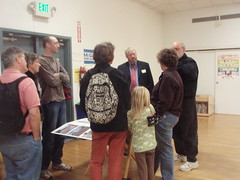
About 25 of our neighbors came to share their ideas with Mike. He was engaging, patient, and smart. He listened and responded thoughtfully. He does not seem like a politician. Will people vote for someone who doesn’t seem like a politician? I hope they do. Mike McGinn is working very hard to establish personal connections–he’s not slick or packaged. He’s honest about not knowing the answer to everything. Attending a McGinn event is a refreshing change from closely-managed rallies with talking points.Â
Campaign volunteer (and Southeast Seattle community activist) Thao Tran introduced him by name, then Mike shared his personal history. He’s originally from Long Island, New York. His parents were both involved in public education: his dad, a school administrator, his mom a pre-K and Kindergarten teacher. Mike and his wife have three kids in Seattle public schools. Public education is very important to McGinn, on a personal level. He’s committed to improving the quality of Seattle public schools.
He moved to Seattle in 1989, practiced law for a while, then founded Great City–a nonprofit striving to “enhance our quality of life, help preserve our region’s natural beauty, and make Seattle a model of economic and environmental sustainability.” Mike explained that Great City was–in part–responsible for putting the Pro Parks Levy on the ballot and helping pass it.  Mike got the community organizing bug. He threw his name in for mayor, believing that the race needed to be about the future. He won the primary, and is running against Joe Mallahan to be our next Mayor. It’s a surprise to everyone–including Mike. He says, “Everyone expected this race to be between Nickels and someone. It’s not–it’s between two new guys. That gives a chance to talk about the future. We still need to learn from the past–but let’s talk about the future.”

McGinn’s campaign is run entirely by volunteers. He rides his bike, takes mass transit, and relies on rides from supporters to get to events.  He’s gotten the most press from his vocal opposition to a deep-bore tunnel replacing the Alaskan Way viaduct. Neighbors asked Mike about the tunnel and how he would do things differently. He laid out a clear, succinct argument. Google “Mike McGinn tunnel” to hear it.
I was more interested in how he felt/what he thinks about all the other issues facing Seattle. We’ve heard a lot about how McGinn opposes the tunnel. It turns out McGinn supports a lot of other things: improving public schools, supporting neighborhoods, making Seattle safer, saving money, creating a broadband public utility, and lots of other things. His campaign established a website so you can share your thoughts: www.ideasforseattle.org.
Are you registered to vote at your current address? Have you researched the candidates and the issues on the ballot? Be a good neighbor; be an informed, engaged voter. Attend meetings, read materials, talk to your neighbors. We are choosing a new mayor for the first time in eight years. This decision will shape our neighborhood for years–if not decades–to come.
